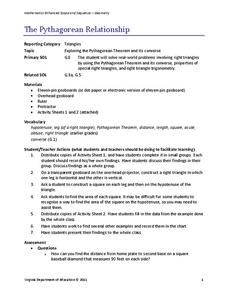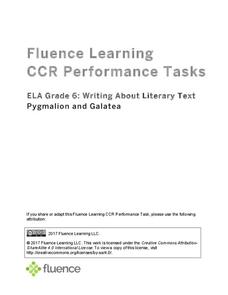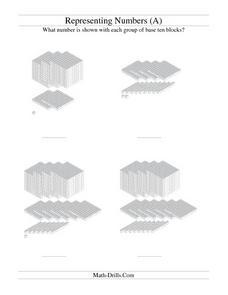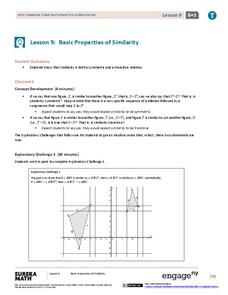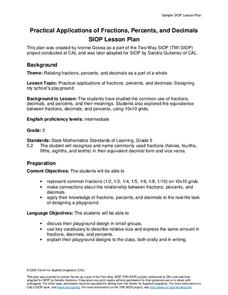EngageNY
Factoring Expressions
Factor in an informative resource when teaching about factoring. The 11th lesson in a 36-part module shows pupils how to factor algebraic expressions by applying the distributive property. Some of the problems involve expressions with...
Virginia Department of Education
Box-and-Whisker Plots
The teacher demonstrates how to use a graphing calculator to create box-and-whisker plots and identify critical points. Small groups then create their own plots and analyze them and finish by comparing different sets of data using box...
K5 Learning
Sun, Stars and Moon
Learners read about the objects we see in our night and day skies before answering five short answer comprehension questions.
Fluence Learning
Construct Viable Arguments About Adding Fractions
Test mathematicians' knowledge of adding fractions with a brief assessment that challenges them to play teacher while correcting a peer's work. Scholars examine Carl's mathematical response, identify where he went wrong,...
Curated OER
Draw a Picture - Fractions
Learners solve six word problems where they draw pictures in order to identify fractions as parts of a group or to compare fractions. Great practice for your third and fourth graders.
Virginia Department of Education
The Pythagorean Relationship
Add up areas of squares to discover the pythagorean relationship. Small groups create right triangles with squares along each side. They calculate the areas of each square and notice the relationship. Groups construct other types of...
EngageNY
Solving Percent Problems II
Fill in the blanks to find the best discount! Groups complete a table of amounts and percents associated with sale items. Classmates then find the original cost, sale cost, discount amount, paid percent, or the discount percent...
Virginia Department of Education
Congruent Triangles
Is this enough to show the two triangles are congruent? Small groups work through different combinations of constructing triangles from congruent parts to determine which combinations create only congruent triangles. Participants use the...
EngageNY
One-Step Equations—Multiplication and Division
Discover one more step to being able to solve any one-step equation. Scholars continue their work with one-step equations in the 28th installment of a 36-part module. Tape diagrams and algebraic processes introduce how to solve one-step...
EngageNY
Understanding Variability When Estimating a Population Proportion
Estimate the proportion in a population using sampling. The 20th installment in a series of 25 introduces how to determine proportions of categorical data within a population. Groups take random samples from a bag of cubes to determine...
EngageNY
Ordering Integers and Other Rational Numbers
Scholars learn to order rational numbers in the seventh lesson in a series of 21. Reasoning about numbers on a number line allows for this ordering.
Fluence Learning
Writing About Literary Text: Pygmalion and Galatea
Is it crazy to fall in love with your own work, or is that the purest love of all? Compare two renditions of the classic Greek myth Pygmalion and Galatea with a literary analysis exercise. After students compare the similarities and...
Curated OER
Data Analysis Challenge
In this data analysis worksheet, young scholars work with a partner to collect information for a survey. The information is then compiled into a graph. Students must indicate their survey question, the target audience, predict the...
EngageNY
Estimating a Population Proportion
Find the percent of middle schoolers who want the ability to freeze time. The 21st installment in a series of 25 has groups collect a random sample of respondents who answer a question about superpowers. Using sample statistics,...
Curated OER
Base Ten Blocks - Representing Numbers (A)
In this math activity, students solve four problems about base ten blocks. Students write in the value of the base ten blocks shown in each picture.
Virginia Department of Education
Analyzing and Interpreting Statistics
Use measures of variance to compare and analyze data sets. Pupils match histograms of data sets to their respective statistical measures. They then use calculated statistics to further analyze groups of data and use the results to make...
Virginia Department of Education
Properties of Quadrilaterals
What type of quadrilateral is that? Discover the difference between the types of quadrilaterals. Small groups investigate types of quadrilaterals using geometry software to find their properties. To keep track of the different...
Curated OER
Simplifying Rational Expressions
In this algebra worksheet, students simplify rational expressions using common denominators. There are 50 questions requiring factoring and grouping, with an answer key.
Teach Engineering
Dress for Success
Dressing for success is not always about looking sharp. Sometimes it is about staying warm and dry. Present your class with an activity that challenges groups of pupils to design a layered material for blizzard conditions. The teams test...
Teach Engineering
Matching the Motion
It is not always easy to walk the straight and narrow. In the sixth portion of a nine-part unit, groups actively recreate a graph depicting motion. Individuals walk toward or away from a motion detector while trying to match a given...
EngageNY
Basic Properties of Similarity
Does the symmetry and transitive property apply to similarity? The 10th segment in a series of 16 presents the class with a group of explorations. The explorations have pairs show that similarity is both symmetrical and transitive....
EngageNY
Even and Odd Numbers
Even or not, here I come. Groups investigate the parity of products and sums of whole numbers in the 17th lesson in a series of 21. Using dots to represent numbers, they develop a pattern for the products of two even numbers; two odd...
Center for Applied Linguistics
Practical Applications of Fractions, Percents, and Decimals
Young architects are prompted to design a playground in assigned groups. Using a 10 x 10 grid. Your fifth graders will apply their knowledge of fractions, percents, and decimals to the real-world task of designing a playground....
Mathed Up!
Exchange Rates
Eleven questions make up an eight-page practice exercise that focuses on how to compute exchange rates. Money used is the American dollar, Euro, and British pound.







